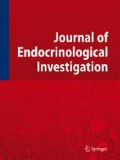Abstract
Cerebral ischemia and symptoms of stroke can occur as a rare manifestation in patients with pheochromocytoma. We describe a 45-year-old woman who was admitted because of a right-sided hemiparesis due to an ischemic lesion in the left hypothalamus. The clinical diagnosis of a pheochromocytoma was proven by highly elevated urinary catecholamines and confirmed histologically after operation. The successful removal of the tumor led to the almost complete recovery of the neurological deficiencies. It is of vital importance to know this atypical presentation of pheochromocytoma. The diagnosis of pheochromocytoma should be suspected in patients with focal cerebral symptoms, particularly in the presence of intermittent hypertension or other paroxysmal symptoms suggestive of pheochromocytoma.
Similar content being viewed by others
References
Fox J.M., Manninen P.H. The anaesthetic management of a patient with a pheochromocytoma and acute stroke. Can. J. Anaesth. 38: 775, 1991.
Ross E.J., Griffith D.N.W. The clinical presentation of pheochromocytoma. Q. J. Med. 266: 485, 1989.
Scully R.E., Mark E.J., McNeely W.V., McNeely B.U. Case records of the Massachusetts General Hospital, Case 15-1988. N. Engl. J. Med. 318: 970, 1988.
Thomas J.E., Rooke E.D., Kvale W.F. The neurologist’s experience with pheochromocytoma. JAMA 197: 754, 1966.
Goswami R., Tandon N., Singh B., Kochupillai N. Adrenal tumour, congestive heart failure and hemi-paresis in an 18-year-old male. A clinical-pathological conference. Int. J. Cardiol. 49: 233, 1995.
Isner J.M., Estes N.A.M., Thompson P.D. Acute cardiac events temporally related to cocaine abuse. N. Engl. J. Med. 315: 1438, 1986.
Sardesai S.H., Mourant A.J., Sivathandon Y., Farrow B., Gibbons D.O. Pheochromocytoma and catecholamine-induced car-diomyopathy presenting as heart failure. Br. Heart J. 63: 234, 1990.
White P.D., Lishman W.A., Wyke M.A. Pheochromocytoma as a cause of reversible dementia. J. Neurol. Neurosurg. Psychiatry 49: 1449, 1986.
Fonseca V., Bouloux P.M. Phaeochromocytoma and paraganglioma. Clin. Endocrinol. Metab. 7: 509, 1993.
Zukowska-Grojec Z. Neuropeptide Y. A novel sympathetic stress hormone and more. Ann. NY Acad. Sci. 771: 219, 1995.
Kirsten R., Breidert M., Sparwasser K., Ochs J.G., Hesse K., Nelson K. Carmoxirole inhibits platelet aggregation in vitro and ex vivo. Int. J. Clin. Pharmacol. Ther. 33: 76, 1995.
Author information
Authors and Affiliations
Rights and permissions
About this article
Cite this article
Lehmann, F.S., Weiss, P., Ritz, R. et al. Reversible cerebral ischemia in patients with pheochromocytoma. J Endocrinol Invest 22, 212–214 (1999). https://doi.org/10.1007/BF03343544
Accepted:
Published:
Issue Date:
DOI: https://doi.org/10.1007/BF03343544




